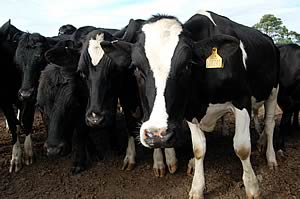 |
|||||||||
|
|||||||||||||||||||
|
|
Million
Pound Success as DNA Testing Rolls Out 27/03/07 A long-running campaign by NFU Scotland has paid off with the introduction from 6 April of a DNA testing process which will allow cattle previously without passports to be fully registered. The Union estimates the success will be worth over a million pounds to the Scottish beef industry and over £10 million UK-wide.
There are 23,500 cattle on UK farms without full passports and NFUS estimates around 10 per cent of these are likely to be in Scotland (although awaits confirmation from BCMS on that figure). These animals are unable to go into the food chain and, beyond any breeding value, are rendered financially worthless as a result. With a passport, these animals would be expected to fetch a market value of between £500-900 on average. The most common reason cattle hold Notices of Registration (NORs) rather than full passports is because the farmer failed to register an animal and apply for a passport within 27 days of birth. The late application rate has continued to fall and has now stabilised at around 0.6% of all applications per year across the UK. NFUS has already won some discretion for Scottish passports applications that arrive shortly after the 27-day deadline, however the Union has been working for a broader solution, which has now been delivered with the introduction of DNA testing. From 6 April, a farmer will be able to arrange for a vet to take a DNA sample of an animal and its mother, which is then sent to an approved laboratory for testing. If the genetic link between the calf and the dam is confirmed, the results can be sent by the farmer to the British Cattle Movement Service (BCMS) which can issue a full passport; a move which could turn an animal of zero value into one worth between £500-900. The farmer must pay for the vet’s time on the farm and then an estimated £30-50 for an official DNA test (the cost may be higher for farmers wanting a quicker turnaround). Farmers should be aware that where a DNA result is negative and a link not proven, the farm will be subject to a herd inspection. NFUS Vice President Nigel Miller said: “This has been the product of around two years of discussion with government and agencies. Passport-less cattle have been a long running sore in the industry and this solution which allows a calf to obtain a passport where its dam is alive and can be DNA linked will be a major financial boost to the industry. “Farmers will have to cover the costs of a vet’s time and the subsequent testing, but if the DNA link is proven, the value put back into the business will far outweigh the costs. This requirement for farmers to pick up the costs associated with the new system will maintain the incentive for applications to be made on time. “Ultimately this delivers a win, not only to farmers, but to government which further enhances the robustness of its traceability system and to the food industry which has previously been denied good product purely because a passport application has been made a few days late.”
|
||||||||||||||||||

|
|
||||||||||||||||||
| home | agri-services | pedigree
pen | news | dairy | beef | machinery property | organisations | site map |
|||||||||||||||||||

